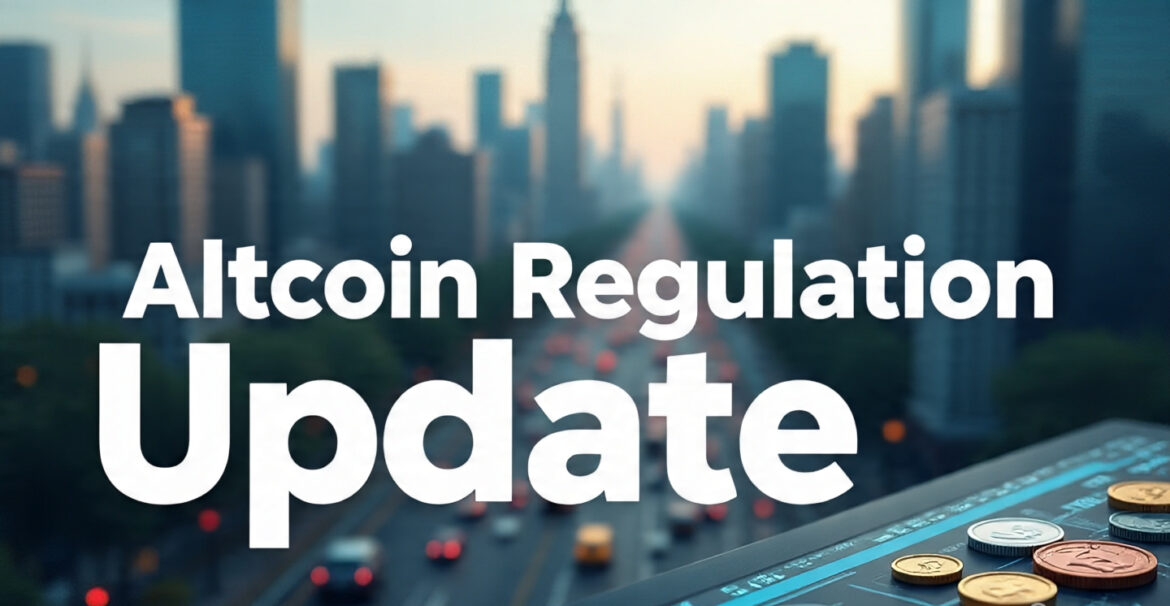The cryptocurrency landscape continues to evolve rapidly, with regulatory developments shaping the future of digital assets worldwide. Understanding the latest altcoin regulatory news is crucial for investors, traders, and blockchain enthusiasts who want to stay ahead of market-moving announcements. Recent months have brought significant changes to how governments and regulatory bodies approach alternative cryptocurrencies, creating both opportunities and challenges for the broader crypto ecosystem. From SEC enforcement actions to progressive regulatory frameworks in emerging markets, the regulatory environment for altcoins is more dynamic than ever. This comprehensive analysis will help you navigate the complex world of altcoin regulations and understand how these developments impact your investment decisions and market participation.
Major Regulatory Developments Affecting Altcoins in 2025
SEC Enforcement Actions and Clarity Initiatives
The Securities and Exchange Commission has intensified its focus on altcoin compliance, implementing stricter oversight mechanisms for digital assets. Recent enforcement actions have targeted projects that failed to register as securities, sending shockwaves through the altcoin community. The regulatory body has established clearer guidelines for utility tokens versus security tokens, providing much-needed clarity for developers and investors alike.
Key enforcement priorities include examining token distribution models, governance structures, and the level of decentralization in altcoin projects. The SEC’s approach has become more nuanced, recognizing that not all altcoins should be classified under the same regulatory umbrella. This shift represents a significant evolution in how U.S. regulators view alternative cryptocurrencies.
European Union’s MiCA Implementation
The Markets in Crypto-Assets (MiCA) regulation has officially taken effect across European Union member states, establishing comprehensive rules for altcoin operations. This landmark legislation provides legal certainty for altcoin projects operating within EU jurisdictions while setting strict compliance requirements for exchanges and service providers.
MiCA’s implementation has created a bifurcated market where compliant altcoins enjoy enhanced legitimacy and market access, while non-compliant projects face significant barriers to entry. The regulation covers stablecoins, utility tokens, and asset-referenced tokens, establishing clear operational frameworks for each category.
Latest Altcoin Regulatory News from Asia-Pacific Region

Japan’s Progressive Approach to Digital Assets
Japan continues to lead in creating favorable regulatory environments for altcoin innovation. The Financial Services Agency (FSA) has introduced streamlined approval processes for certain categories of altcoins, particularly those with clear utility functions. This progressive stance has attracted numerous blockchain projects to establish operations in Japan.
Recent updates include simplified licensing requirements for altcoin exchanges and reduced compliance burdens for projects demonstrating genuine technological innovation. The Japanese approach emphasizes protecting consumers while fostering innovation, creating a balanced regulatory framework that other nations are studying closely.
Singapore’s Digital Asset Framework Evolution
Singapore’s Monetary Authority (MAS) has refined its approach to altcoin regulation, introducing risk-based compliance requirements that vary based on token characteristics and use cases. The updated framework recognizes the diverse nature of altcoins and applies proportionate regulatory oversight.
New guidelines address decentralized finance (DeFi) protocols, non-fungible tokens (NFTs), and governance tokens, providing clarity for projects operating in these emerging sectors. Singapore’s approach has positioned the country as a preferred jurisdiction for compliant altcoin projects seeking regulatory certainty.
Global Regulatory Trends Shaping Altcoin Markets
Central Bank Digital Currencies (CBDCs) Impact
The accelerated development of CBDCs worldwide is creating new regulatory considerations for altcoins. Central banks are increasingly focused on ensuring their digital currencies can coexist with existing altcoin ecosystems while maintaining monetary policy effectiveness.
Recent developments include interoperability standards between CBDCs and select altcoins, creating new opportunities for compliant projects. However, this trend also introduces competitive pressures as government-backed digital currencies enter markets traditionally dominated by altcoins.
Cross-Border Regulatory Coordination
International regulatory bodies are increasing coordination efforts to create consistent frameworks for altcoin oversight. The Financial Stability Board (FSB) and International Organization of Securities Commissions (IOSCO) are working toward harmonized standards that could simplify compliance for global altcoin projects.
These coordination efforts aim to prevent regulatory arbitrage while ensuring consistent investor protection across jurisdictions. The success of these initiatives could significantly impact how altcoins operate in global markets.
Compliance Requirements for Altcoin Projects
Know Your Customer (KYC) and Anti-Money Laundering (AML)
Modern altcoin projects face increasingly stringent KYC and AML requirements across multiple jurisdictions. Regulatory authorities are demanding robust identity verification processes and transaction monitoring systems to prevent illicit activities.
Compliance costs have risen significantly, with many projects allocating substantial resources to legal and regulatory affairs. However, these investments often translate into enhanced credibility and broader market access for compliant altcoins.
Reporting and Disclosure Obligations
New reporting requirements mandate regular disclosure of key metrics including token distribution, governance activities, and financial health indicators. These obligations are designed to enhance transparency and investor protection in altcoin markets.
Projects must now maintain detailed records of token transactions, governance decisions, and material changes to protocol parameters. This increased transparency burden has prompted many projects to invest in professional compliance infrastructure.
Market Impact of Recent Regulatory Changes
Price Volatility and Trading Patterns
Regulatory announcements continue to drive significant price volatility in altcoin markets. Positive regulatory developments often trigger substantial price increases, while enforcement actions or restrictive policies can cause sharp declines.
Market participants are increasingly factoring regulatory risk into their investment decisions, leading to more sophisticated risk management approaches. This evolution is contributing to greater market maturity and institutional participation.
Exchange Listings and Delisting Trends
Cryptocurrency exchanges are becoming more selective about altcoin listings, prioritizing projects with clear regulatory compliance. This trend has created a two-tier market where compliant altcoins enjoy broader exchange access and liquidity.
Conversely, projects with unclear regulatory status face increasing delisting pressure, particularly from exchanges operating in highly regulated jurisdictions. This dynamic is pushing altcoin projects toward proactive compliance strategies.
Institutional Adoption and Regulatory Clarity
Investment Fund Participation
Institutional investment funds are showing increased interest in regulatory-compliant altcoins. Clear regulatory frameworks enable these institutions to include altcoins in their portfolios while meeting fiduciary obligations.
Recent months have seen several major investment funds announce altcoin allocation strategies, citing improved regulatory clarity as a key factor in their decision-making process. This institutional interest is providing new sources of capital and legitimacy for compliant projects.
Banking Sector Integration
Traditional banks are cautiously exploring altcoin-related services, with regulatory clarity serving as a prerequisite for meaningful engagement. Some banks have begun offering custody services for select altcoins that meet strict compliance standards.
This trend toward banking sector integration represents a significant milestone in altcoin mainstream adoption. However, banks remain highly selective, focusing only on altcoins with robust regulatory compliance and clear utility functions.
Emerging Regulatory Technologies
RegTech Solutions for Altcoins
Regulatory technology (RegTech) solutions are becoming essential tools for altcoin compliance. These platforms automate compliance processes, monitor regulatory changes, and ensure ongoing adherence to applicable requirements.
Advanced RegTech platforms now offer real-time compliance monitoring, automated reporting, and predictive regulatory risk assessment. These tools are helping altcoin projects manage complex regulatory requirements more efficiently.
Blockchain-Based Compliance Monitoring
Some regulatory authorities are exploring blockchain-based compliance monitoring systems that can track altcoin transactions and activities in real-time. These systems could revolutionize regulatory oversight while reducing compliance burdens for projects.
Early pilot programs have demonstrated the potential for blockchain-based regulatory monitoring to enhance transparency and reduce regulatory friction. However, privacy and decentralization concerns remain significant challenges.
Regional Regulatory Spotlight
United States Legislative Developments
Congressional efforts to establish comprehensive cryptocurrency legislation continue to evolve, with several bills specifically addressing altcoin regulation. These legislative initiatives aim to provide clearer regulatory frameworks while promoting innovation.
Recent hearings have featured testimony from altcoin project leaders and regulatory experts, highlighting the need for balanced approaches that protect investors without stifling innovation. The legislative process remains complex, but momentum toward comprehensive crypto legislation continues to build.
United Kingdom’s Approach to Digital Assets

The UK government has outlined plans for comprehensive digital asset regulation, including specific provisions for altcoins. The proposed framework emphasizes innovation while ensuring appropriate consumer protection measures.
UK regulators are conducting extensive consultation processes with industry stakeholders to develop practical and effective regulatory approaches. This collaborative approach has been well-received by the altcoin community and could serve as a model for other jurisdictions.
Future Regulatory Outlook
Predicted Regulatory Trends
Industry experts anticipate continued regulatory evolution with increasing focus on functional regulation rather than one-size-fits-all approaches. This trend suggests that different types of altcoins will face tailored regulatory requirements based on their specific characteristics and use cases.
The move toward functional regulation could benefit innovative altcoin projects by reducing unnecessary compliance burdens while maintaining appropriate oversight. However, this approach also requires more sophisticated compliance strategies from altcoin projects.
Technology-Driven Regulatory Innovation
Emerging technologies like artificial intelligence and machine learning are being integrated into regulatory oversight systems. These technologies could enable more efficient and effective altcoin regulation while reducing compliance costs.
Regulatory authorities are exploring how these technologies can improve their ability to monitor altcoin markets and identify potential risks. The success of these initiatives could significantly reshape the regulatory landscape for digital assets.
Conclusion
Staying informed about the latest altcoin regulatory news is essential for anyone involved in the cryptocurrency ecosystem. The regulatory landscape continues to evolve rapidly, creating both opportunities and challenges for altcoin projects and investors. As governments worldwide develop more sophisticated approaches to digital asset regulation, the importance of compliance and regulatory awareness cannot be overstated.
The trends discussed in this analysis demonstrate a clear movement toward more comprehensive and nuanced regulatory frameworks. Projects that proactively address compliance requirements are positioning themselves for long-term success, while those that ignore regulatory developments face increasing risks.
Read More: Crypto Market Crash News Today Live Updates & Analysis



